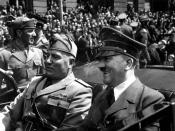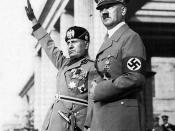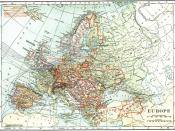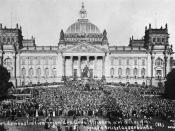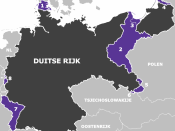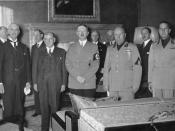Adolf Hitler, the fascist dictator of Germany, has placed him among historyÃÂs most hated villains who led the deaths of millions in the Second World War. Simultaneously, he is viewed as the leader who led the Nazi party to victory and defeat, and brought the nationalist movement together. In todayÃÂs world, Hitler remains to be regarded as an enigmatic character. Indeed, HitlerÃÂs rise of power after the First World War was a significant turning point of our history of mankind as a whole, and therefore, deserves to be questioned. After GermanyÃÂs defeat in the war (1914-18), a new constitution Weimar Republic was established in 1919, which was followed by three main periods. The first chaotic and anarchic period existed from 1919 to 1923, consisting of left/right wing rebellions and invasions and inflations. Those years encountered HitlerÃÂs rise to power and his ability to be reflected as a strong leader to the German society.
However, his support was not gained overnight. It was the result of his gift for mesmerizing the vast crowds with his frenzied speeches, his hatred towards the Treaty of Versailles and ÃÂinferiorÃÂ race who became HitlerÃÂs scapegoat, thus providing an explanation to GermanyÃÂs problems.
Hitler was a gifted public speaker who could collect the hopes and longings of his audiences, then focus them with fascinating, vivid language. An eyewitness account which captures the emotional appeal of totalitarianism is as follows:ÃÂThe speech is over. As it has proceeded the voice has become higher, more staccatoÃÂhypnotizing as the rapid beat of drumsticks on the tom-tom. The crowd is spellbound. As the speech concludes a storm of cheers and ÃÂheilsÃÂ break outÃÂ ÃÂAlthough this account comes from ten years after 1923, it does prove HitlerÃÂs gift to manipulate peopleÃÂs mind through his exciting speeches. Sources describe HitlerÃÂs speech as slow and halting at the beginning, but which gradually warms up when the spiritual atmosphere of the vast crowd is engendered. Hitler waited for the feel of the audience, and as soon as he founded it, the tempo increased until he shouted at the climax. Through all this, the listener seemed to identify himself with HitlerÃÂs voice which became the voice of Germany. In fact, the outdoor gatherings were held in huge sports stadiums, dramatically lit, and accompanied by singing, torchlight processions and other emotionally stirring features. They were often at night because as Goebbels, HitlerÃÂs best propagandist emphasized: ÃÂThe beast in man comes out at night.ÃÂ There are no doubts in the view that Hitler possessed the superior ability to address huge crowds in ways that excited them and appealed to their emotions.
The right wing Germans wanted to believe in the strong leader who vowed to tear up the Versailles treaty and end GermanyÃÂs reparation. The financial struggle begot from the inflation during 1922-23 was devastating and families faced great hardships. GermanyÃÂs economies were in ruins, but they were expected to pay 132 million marks of reparations to the victorious Allies. The Weimar government had to borrow a huge amount of money from other nations and the governmentÃÂs eventual decision to print out paper money exacerbated the situation. This incident completely shattered the confidence of the Germans. In result, people were willing to listen to a leader with extreme ideas who promised a better quality of life and rescue them from the suffering that started as the Treaty of Versailles was signed against their wills in June 1919. The Germans felt strong anger toward the treaty itself and to the leaders who agreed to the terms, referred as the ÃÂNovember criminalsÃÂ by the non-communists. Through overturning the Treaty of Versailles, the Germans believed their lives would improve by subsequently retrieving the lost territories and rebuilding the army, getting self determination and being absolved from the responsibility of the huge amount of reparation, which was the primary cause of the economic down crash prior to the formation of Dawes Plan in 1924 that eased German reparation payments. Therefore, many supported Hitler for his hatred towards the Treaty of Versailles, and sure enough, they expressed fresh enthusiasm for a leader who was attempting to restore German honor.
HitlerÃÂs gain of support until 1923 also resulted from the hatred towards the Jews and the Weimar Republic. He believed in the creation of a racially pure German state would benefit the nation and provide more Lebensraum for the Aryan race . Whether Hitler really wanted racial cleansing or used it as a mere tool of gaining support is controversial. However, it is to a large extent true that many of the Germans approved of such racism. Although Hitler used the Jews and other sections of society, such as the communists and the Weimar republic as scapegoats, blaming all the problems on them, to Germans at the time Hitler made sense, thus he united everyone by providing explanations for GermanyÃÂs problem. During such a chaotic period from 1919-1923, Hitler confidently pointed out all the factors that seemed to be contributing to the hardships of peopleÃÂs lives which gave his supporters hope for recovery through eliminating the weaknesses of the nation.
However, from certain respects, it is doubtful whether Hitler even gained much support up to 1923. If he did, then why did Hitler not come to power in 1923 but succeeded in 1933? Reasons may vary. In 1923, HitlerÃÂs Party was newly formed and his supporters were numbered relatively small. During this period his Party was not a major force in national politics, and the problems facing those who supported democratic government in 1923 were not nearly as great as those facing Germany in 1933. Finally, in 1923, the President did not invite Hitler to become Chancellor like in 1933. Nevertheless, as to the question on how Hitler gained support up to 1923, there may be a number of possible answers. Most importantly, he enthralled his audience through delivering his speeches, and people had common hatred with Hitler towards the Treaty of Versailles, the Weimar Republic and the Jews for they all wanted an explanation for GermanyÃÂs problems and had sought a solution to their own despairs.
NotebookWorld History Second Edition, p. 762http://www.ess.uwe.ac.uk/documents/osssection2.htmExploring World History, P. 555Exploring World History, P. 555Conflict, Communism and Fascism, P.90http://www.johndclare.net/Nazi_Germany2.htmhttp://www.bbc.co.uk/scotland/education/bitesize/standard/other/sos/history/people_and_power/answerpower_40.shtml
